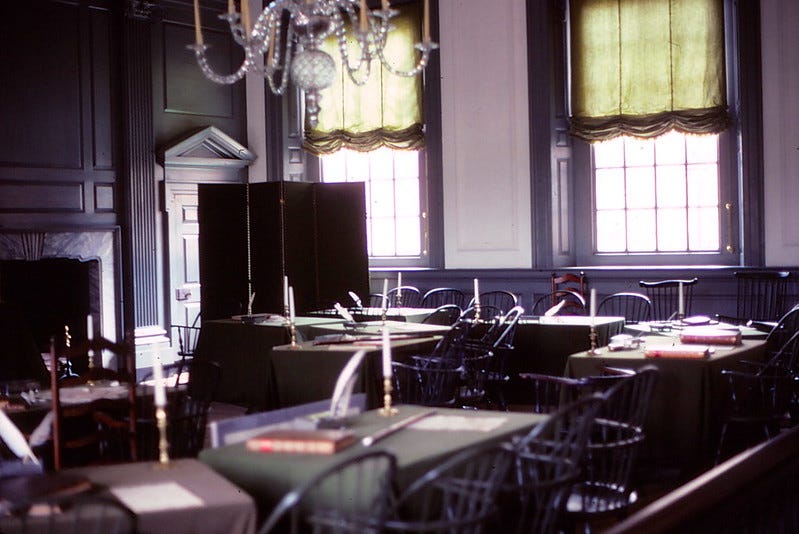Weekly Hit of History: The Beginnings of the U.S. Constitution
Before Americans heed the radical calls to move beyond the Constitution, they should consider the storms America has weathered under it.
Weekly Hit of History: The Beginnings of the U.S. Constitution
By: Elad Vaida
“Signing of the Constitution,” oil on canvas by Howard Chandler Christy, 1940. Courtesy of the Architect of the Capitol.
Summary
On May 14, 236 years ago, delegates gathered in Pennsylvania’s State House—now immortalized as Independence Hall—the birthplace of the Declaration of Independence. Their initial purpose was to make much-needed revisions to the Articles of Confederation, but they emerged four months later with the U.S. Constitution, one of history’s most important political documents, which took a loose association of states and forged them into a nation.
Under the Articles of Confederation, America’s governing framework before the Constitution’s ratification, America was the “United States” more in name than in fact. The nation was disunified, Congress couldn't raise money through taxes, and the government was weak when facing internal rebellions. Any amendments to the Articles required a unanimous agreement from all thirteen states—meaning a single state could block vital, necessary changes. All of these weaknesses resulted in, as George Washington said, “a half starved, limping Government, that appears to be always moving upon crutches, & tottering at every step.”
The delegates faced a difficult road. They seemed to agree on little besides their shared admiration for George Washington, whose powerful presence gave the proceedings legitimacy. Some delegates wanted the new government framework to favor large states, others wanted small states to have more power; some came from slave states, some from free states, but eventually, after months of debate and hard-fought compromise in a “stifling hot room,” they emerged with the Constitution. That Constitution would define America’s soul for the future.
Why should you care?
The Constitution is a brilliantly crafted document—the fruit of exceptional minds who understood a crucial fact about human nature: people are deeply flawed and will generally try to acquire power for the sake of power. That’s why the Constitution divides the government into three branches and institutes healthy checks and balances to ensure no one branch of government grows too large and becomes tyrannical.
The Constitution is a rock that has given the U.S. a unique stability. Yes, America has passed through many storms, including bitter political fights over slavery, a Civil War, economic downturns, world wars, and the social and political unrest of the 1960s (and today), but it has preserved the same basic regime structure for more than two centuries.
George Washington's statue in the rotunda of the Capitol. Phil Roeder/Flickr.
If you’re tempted to take the Constitution for granted, compare America’s history to that of other countries in the 236 years since those delegates met in Independence Hall. In this time period, France see-sawed between monarchy and republicanism. The French Bourbon monarchy fell to the radical rule of the French Revolution, which in turn was replaced by Napoleon’s empire, which was then replaced by a restored Bourbon monarchy, which was overthrown and replaced by a short-lived republic that was then replaced by Napoleon III. And that doesn’t even include all the other convulsions France went through before landing on the Fifth Republic, its current governing structure.
Germany went from being a collection of independent states to a unified, centralized empire. That empire fell as a result of the First World War, which gave birth to the unstable Weimar Republic, which fell to the Nazis, who were only defeated after another destructive world war, to be replaced by a democratic system.
Russia in the same time period went from the Tsarist empire to a communist totalitarian dictatorship before becoming a short-lived and unstable democracy that was replaced by Vladimir Putin’s authoritarian rule.
Independence Hall in Philadelphia. Barbara Ann Spengler/Flickr.
These political upheavals cost millions of lives and created social catastrophes that likely seemed never-ending to the poor souls who had to suffer through these terrible times. The tragic instability in France, Germany, and Russia—not to mention a host of other countries—was avoided in America in large part because of the Founders’ political genius and foresight.
The Constitution’s many enemies would like to trample it in their hasty dash to utopia, but it still stands as the heart of America’s government. Before Americans heed the radical calls to move beyond the Constitution, they should consider the storms that America weathered because of this brilliant document and be grateful for the men who drafted it that hot Philadelphia summer.







